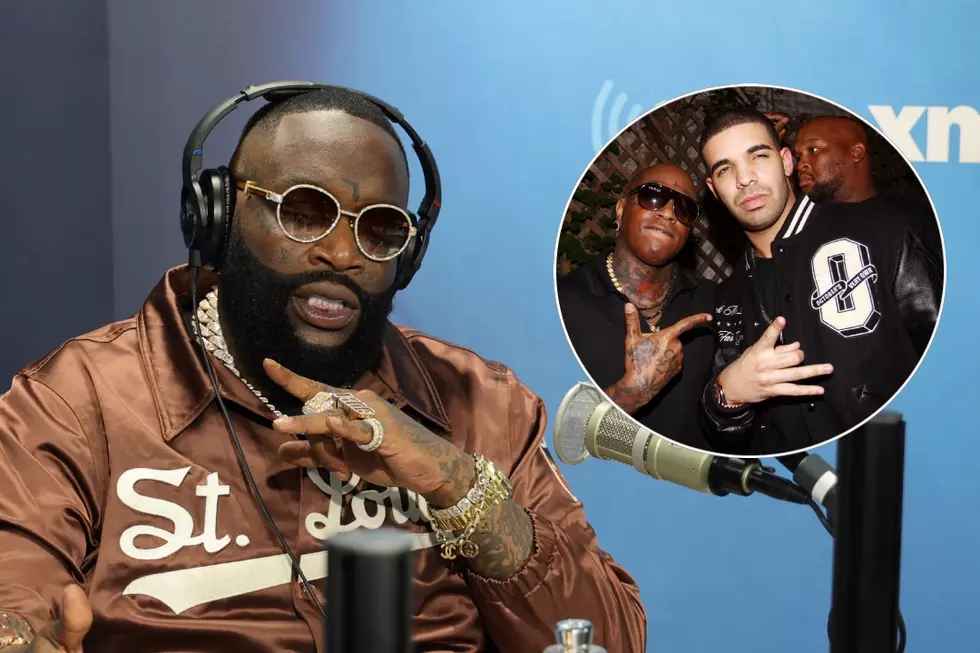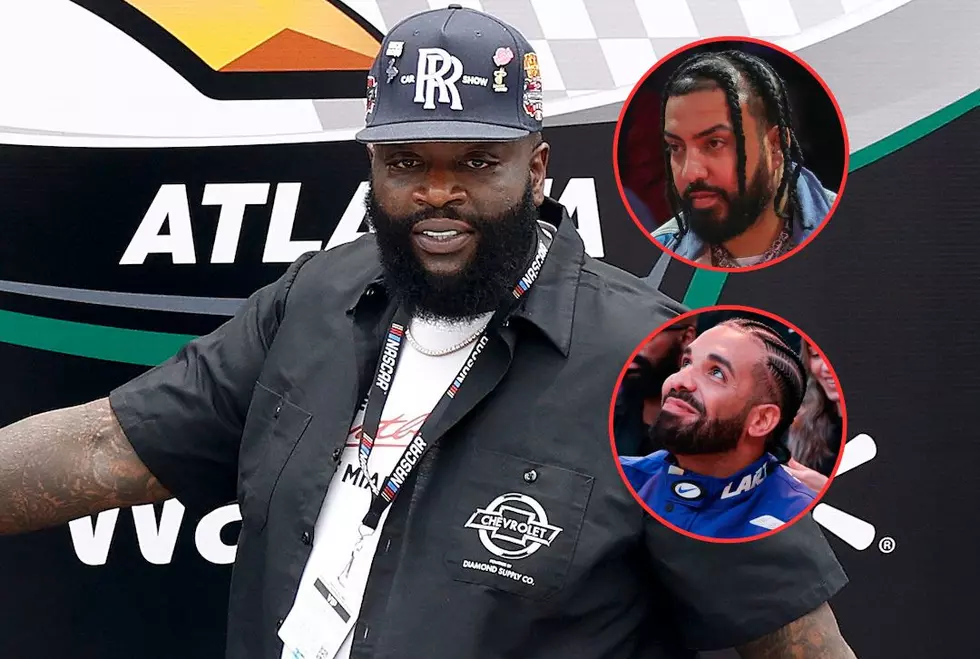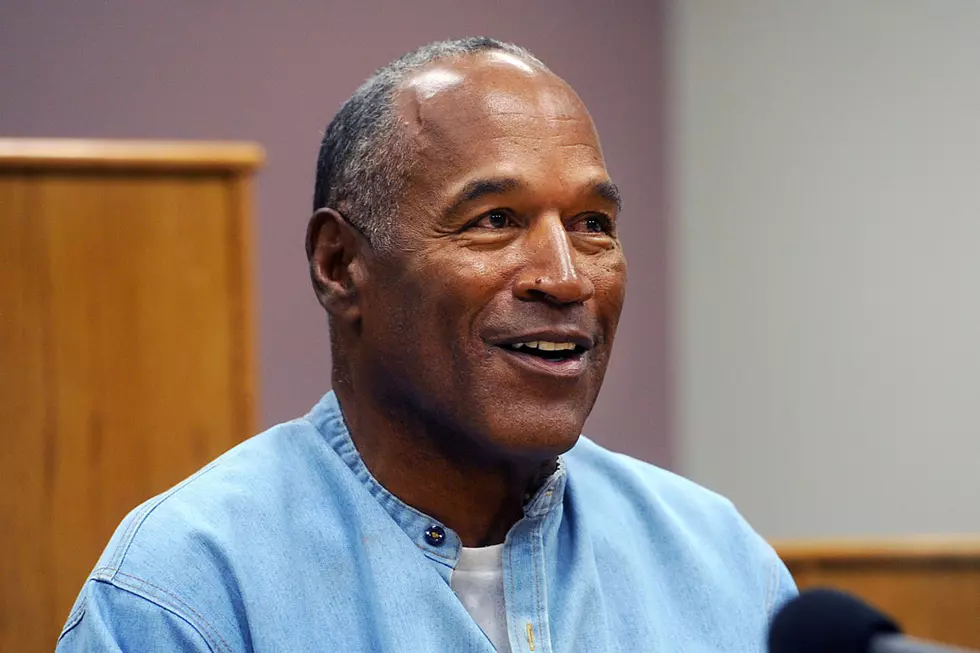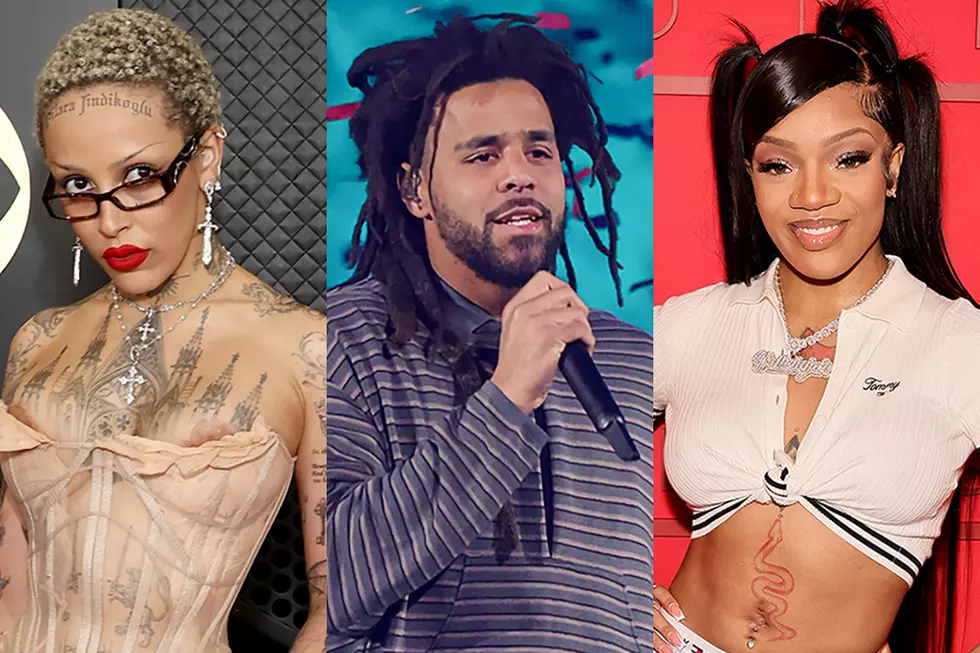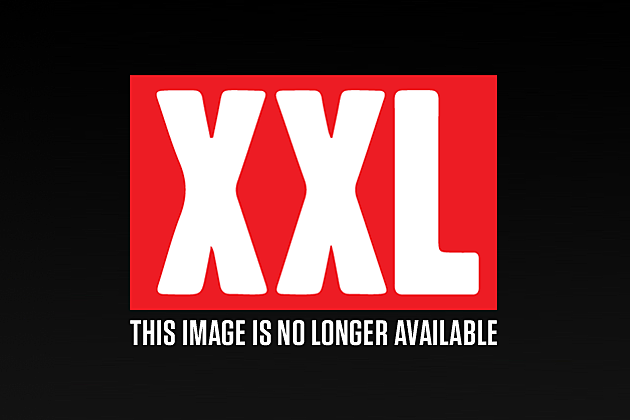
The Come Up: Detail
Noel “Detail” Fisher has been behind the scenes crafting the biggest hits for Akon, Katy Perry, Lil Wayne and more. Producing for those household names got him his first big hit with 2011's “How To Love,” which established Detail as an artist who can do more than just create a hot beat. The songwriting and hookcraft abilities are there, and he’s ready to become a well-rounded talent in hip-hop.
“Detail's amazing, I watch him freestyle, musically he's talented, he writes a lot of the biggest hits that he has, he's a brainiac, he's a musical genius. I can't wait 'til the world see it.” Young Money CEO Mack Maine tells XXL. “It's steadily happening, everybody's starting to respect his artistry. Before it was like, 'you don't know how to dress.' Nah, he's doing his own thing, he's being him, he doesn't have to dress like everybody else. He doesn't make music like everybody else, so why does he have to dress like everybody else?”
Detail may be best known for being a co-executive on Ray J’s Raydiation, which was his first major contributions on an album. However, times have changed for the 29-year-old, who is currently working in the studio with the likes of Drake and Beyoncé. And of course, you can’t forget his performance on Young Money’s Rich Gang. Detail’s music is starting to take a life of its own, thanks to his constant grind and major assists from Weezy. Recently, XXL sat down with the budding artist to find out about producing at an early age, the advice his mentors Birdman and Mack Maine give him, his chemistry with Wayne, and what to expect from his debut album.—As told to Eric Diep (@E_Diep)
On Growing Up In Detroit, Michigan:
Detail: "Shout out to Detroit right now. I’m doing some things. I know y’all probably heard—about the economy and what’s been going on with Detroit. Trying to file for bankruptcy, and I just feel like Detroit is such a survival city. I think that education is lacking in Detroit. A lot of things that I learned, I am probably time and a half of my age because of what I learned. Having sex at 12 years old and my first cousin, her having a baby at 13. Just what I experienced. Everything starts earlier. Living in a dopehouse at 13. Away for four days out of the week. I don’t know how my momma didn’t call the police. How did she let me do that? You know what I am saying?
"Detroit is like that. It’s a tough struggle. You grew up very fast. I went to jail at 14. CCW and a drug case in juvenile and got out and went to jail again at 15, got out when I was 17. Started doing music, went back to school. Graduated from high school, which was a great accomplishment in the hood. Nobody in my hood graduated from high school. None of my brothers or nobody. I don’t know nobody that graduated. When I got out of jail that was pretty dope.
"I never had a job, I sold dope my whole life. For me, my friend did music. He was one of the dudes in the hood nobody bothered. He wasn’t in the streets. You gave one person in the hood a pass. That went to school and did everything right. You might of stole his shit, but you gave him a pass. He was the one that did music. When I got out of jail, I started working with him because I never had no job. I just looked at it like this: If I get another strike, I am gonna do five years. I was like, I am not going to get a job, so we’ll just do music to figure it out later. That’s kind of what happened. I got so excited about music."
On Quincy Jones As A Major Influence:
Detail: "Detroit has a lot of churches. Gospel music is really strong in Detroit. It’s the strongest in Detroit. I think Motown music is gospel music, but just more poppy. Just going to West Grand Boulevard to the Motown Museum. That’s the first thing I did when I got out of jail. That inspired me to do music.
"One of my biggest influences is Quincy Jones. I felt like he was the only guy that produced … you got all these groups from The Pointer Sisters to Four Tops to The Temptations. When you think of a Temptations and a Four Tops that’s eight guys doing the same thing, but he gave them something different. All of the projects that he was working on, his sounds, his genres that he tapped within that Motown sound were very broad. I felt like coming out of Detroit, I felt like I can work with a Katy Perry and then a work with a Lil Wayne. I felt it was possible.
"Those are my inspirations of producers. Pharrell. He’s sound is so unique. He crosses so many genres. I am a major fan of Pharrell. I don’t know if he likes my music. I think we tried to get together a while back ago. It didn’t happen. I heard something that he didn’t want to work with me or some weird shit. I’m like, ‘Whoa.’ I’m a major fan of Pharrell. I couldn’t be a bigger fan."
On Wanting To Be An Artist:
Detail: "I wanted to be an artist first. Every brother in the hood want to rap, but I can actually sing because I was in choir. I wanted to be an artist. My friend was so dope with the piano, like he taught me everything he knew. I just started learning piano. I couldn’t afford nobody to actually work on some stuff for me. Somebody in that area did music, you had to at least have $100 or $200 dollars to get some music. So, I just learned music myself so I could do stuff for myself. And then, it went from that to me producing tracks for dope boys in the hood just to get equipment. I might do a session with somebody for $200 or $300 and go get me some floppy drives or go get me a computer module, or a keyboard module. Or something like that. It just became a hustle. I would use the money that I made to invest in myself.
"It was so ironic that this is the business that I am in right now. I just realized a year ago that I am doing that same thing over and over. When Wayne got out of jail, he jumped on a song in February for me called “Tattoo Girl.” When he got out of jail, I just moved and got up. Flew out to Miami and paid for a hotel out of my own pocket for three months. I paid for The Hit Factory where he worked for three months. It wasn’t like Cash Money would pick it up. They didn’t know me. I was just like, ‘Ok, Wayne is working in this room. I am going to get this room and I am going to be here for three months and submit this nigga tracks.’ Cause I feel like if I continued this, he from what I saw, follows energy. He’ll know my passion is real. I don’t want nothing from him, trying to pay for my trips or none of that. I just want to submit him music. It was also a thank you for jumping on my record. That’s how we got “How To Love.” It was just dope. It worked. It’s been working and kept working."

On Working On Ray J's Raydiation And His Sound:
Detail: "When I was a little kid, I went to church a lot. I was in a kid’s choir and all that type of stuff. It just all came back to me. Musically, it was empowering at that moment. I was always looked at it like, 'If there’s work, then I am happy here.’ So my first placement I was like, ‘Wow, I made it. It didn’t matter.’ I had no end objective. I could get locked up tomorrow and I’m cool because I actually made Ray J’s album. So I am fine, I can go back to the streets and whatever. They all know I did it. I made it out for one second, that’s all I look for. But, it just kept going from one thing to the next to the next to the next. I just kept hustling.
"To be honest, it’s hard to hear that it’s a Detail record. I’m so in tune with the artist. “Sexy can I? Just pardon my manners,” don’t sound like, “Get it in to the sun rise, do 90 in the 65.” You know what I am saying? Or, it doesn’t sound like what it sounds like with Sean Kingston, “Let Go.” Or, any other records that I have worked on. None of that sounds nothing like going from “How To Love” to Beyoncé.
"I kind of come in like water. By the time I’m done, it’s not me it’s them. It’s just a better them. Whatever I saw, I can bring out of them. I really knew Wayne could sing. I studied “Leather So Soft.” I just knew if we got in and really just worked on all of the stuff properly that we will be able to have another “How To Love.” Taking them to that direction and exploring those sides of artists that people don’t explore. That’s what I am about. That’s been my signature. It’s only a few people in this business. A lot of people are just beatmakers. They don’t really know what producing is. I don’t even call myself a producer for that matter. I call myself a composer. I can just put the right elements together."
On His Mentors Birdman And Mack Maine:
Detail: "Mack Maine was one of the ones that guided me through the whole Cash Money process. He got me with Wayne. We just started to work. Mack was actually the first person that I sent “How To Love” to. He liked the ideas that I was coming up with and brought it to Wayne. Wayne liked it. He came in and Wayne did his thing and made it a monster. We have history.
"I am bit of a jitterbug. When I see something, I just go. I just get anxious. It’s like this King Kong on chains type thing. I learned from Wayne by mistakes because Wayne will let me go out. He doesn’t stop me. He’s more like, ‘Go!’ Nah, let’s see what it is. Mack is more of a counselor. A mentor that will allow me to learn some shit before I jump out there. I think they both have great formulas. Birdman and Mack Maine are more like they want you to embrace everything and understand everything so you can make the right decisions. Then you learn how to sustain yourself.
"Wayne on the other end, he can push you there to where when you trip and fall, you learn from that. Because you got what it takes to be here, you ain’t going nowhere. Sometimes, you do need to trip and fall. He kind of gives you that outlet to trip and fall. And they kind of giving you the outlet of learning how to avoid the pothole. It’s a great combination."
On His Chemistry With Lil Wayne:
Detail: "When I had “Tattoo Girl,” I got it to Mack. Wayne was going to jail and I really wanted him on a song, but also a video. Mack pulled that off for me. I don’t even know how that happened. He had Diddy in line. He had so many people in line, just to get videos before you go in. I just felt I would be definitely last on the list. I got a call. 'Wayne, he’s gonna do it tomorrow.' So I was like, ‘Ok, let’s do it.’ Obviously, when he got out, I had to go in.
"“No Worries” was just a weekend. We was actually at the studio just partying all weekend. He let me do a hook. Who fucking does that? I didn’t even think he would listen to me doing hooks and shit. We was all partying and everything. Somebody said, ‘We good. We good here and this and that. I know we got no worries.’ Then I was like, ‘Oh shit, that’s a song.’ He was like, ‘Go do that shit.’ I went upstairs. Remember, like I said, you are going to trip or you are going to stand. So I went up there and I cut it. I brought it down and I waited until the end of the night. As anybody know with Wayne, you gotta wait. He creates everything in his brain, you can’t interrupt that flow. If he downstairs working on a song, he works out of his brain. You can’t just go in and throw the song on. You are throwing this brain off. [Laughs] So I waited until the end of the night. Played it. He turned up. I was like, ‘Damn that was big.’
"For “Romance,” I think me and Wayne got a good chemistry, always giving the ladies a lady records. I thought that it was dope. We would primarily do it for Tha Carter, but we did for I Am Not A Human Being. So it was a matter of which direction he wanted to go in for I Am Not A Human Being. I think that’s something that’s going to be classy between me and him. Collaborating is always giving the ladies a lady’s records. Nowadays, club records can be lady records. But I am talking about a girl can sit down and be helped. “How To Love” helped people. “Romance” helped. Don’t look at romance so serious, if I fuck you at your job, that’s romance.
"I just know when me and Wayne focus on women. Pause. That might not sound right. That’s the only thing we focus on. [Laughs] I’m just saying, when we start to work on music specifically for women, it’s like there’s no losing in it. Because here you got the biggest rapper in the entire world that see things from a point of view. And then you have someone like me who sees things from a point of view. Just don’t nobody know me. Our experiences is top to bottom, but we still have the same outlook and ending. Just conceptually coming to the table with some great ideas it just becomes magical."
On His Contributions To Rich Gang:
Detail: "It was a long haul, a long process to make this album. I was really excited about this album because Birdman gave me the opportunity to put my hand around the whole album. I am on like four tracks, I produced seven tracks off of it. We turned a mixtape into an album. He put out a mixtape. Me and him talked about doing it as an album. Future was actually the first artist that we reached out to outside of our camp. I just thought Rich Gang was an opportunity for my music to really make sense. When I first start doing music—like with Ray J—his first album, I actually did like nine songs on the album. I was the co-executive. We did interludes and an intro. I felt like we could go back to interludes, intros and make a nice solid sounding album."
On His Production Team:
Detail: "Primarily it’s me, but I definitely have a good group. Again, like I said, I am a composer and that is what allows me to expand my musical genre. It’s a different genre of music. Instead of trying to do hi-hats and snares in this world like that, I go to certain people in my team that just do that. And then I have certain people who are phenomenal at transitions. So it’s like, I go to certain [people]. I might put together a beat and I’m always in post-[production] in my mind. Like I said, I am a real composer. But I am always thinking post. When you do a track, by the time the artist lays it and before it gets mix, you’ve added sounds. Maybe taken some out. Things like that. I am a stickler on that to make sure the energy and elements are there.
"When we did “How To Love,” we were talking about getting a live orchestra. We were gonna get Kanye’s guy that does his, but then I turned around and I was like, ‘You know what? I am going to take a shot at it.’ Cause I learned that from Teddy Riley. That’s another one of my favorite producers. I learned that from Teddy Riley just to be able to compose. Go from the cello to the viola to the violin one, violin two. That’s how “How To Love” got the strings. That wasn’t originally there when we first did the record. That was in post-production. In post-production, if I make the beat, I can have The Order, which is part of my production team, touch up on one. Like, ‘I want these 808s to sound heavy like this.’ We might change the 808s and vice versa from that to Outer Limits. I might have Outer Limits, they are so dope with their live, organic sound. They sit and pull drums out of shit. Old J. Dilla drums and shit like that. I got this guy name Dre that does the same thing. It’s just so dope. I could of sworn he was born in Detroit, but he was born and raised in Maryland. [Laughs]"
On His Debut Album:
Detail: "I am working on a solo project. I want to incorporate my album into education. I’ve been thinking what I can do. I don’t have enough money, nor can I employ enough jobs. I put a lot of people in great positions from Detroit, Michigan. But, I went back to the source of really education. There needs to be a better education system out in Detroit. I came up with a slogan where I am going to do seminars. It’s called “I Used To Sell Dope.” So basically, the seminar is really built on I might look like a dope dealer, but I don’t sell dope no more. I used to sell dope. I might wear chains. So the representation is the same because it’s a hustle and struggle, I just don’t sell dope anymore. I think that idea will get a lot of people that are on the street hustling to understand that they can make a transition, which I think is important.
"What that makes sense on my album is my album becomes a story. I feel like that if I am not giving back, I just feel like I am a spokesman of identifying things. Whether it is certain girls and the way they go about doing things and how I understand it. My main thing is some form. I might talk dirty as fuck, but its enlightenment. My ultimate purpose is always for growth. It ain’t about me when I ain’t creating records. It’s about growth.
"It’s a lot of emotion. I think that will allow me to set aside from artists that I work with. That paints the story so I don’t have to sit and talk about them because I think when we collaborate together is their [track]. People try to share it. I don’t think it’s mine anymore, it’s their [track]. If I work with anybody, it’s [their] track, otherwise I didn’t truly work with them. You didn’t see Quincy on the scene. You just saw the artist. I think that’s what a true artist is supposed to do.
"The producer—even like Teddy Riley—you would be amazed all of these projects that guide to Michael [Jackson]. You didn’t even know who Teddy Riley was or know he was the one in the group. He was the one producing the songs. You didn’t really know that. He was the lead singer in the group. Same as DeVonte. Those are my idols and I feel when I do an album, by all means, no rush. You’ll know when the album is coming. At the same time, working with these stars, they are challenging me and I am challenging them. I am a problem out here."
More From XXL
